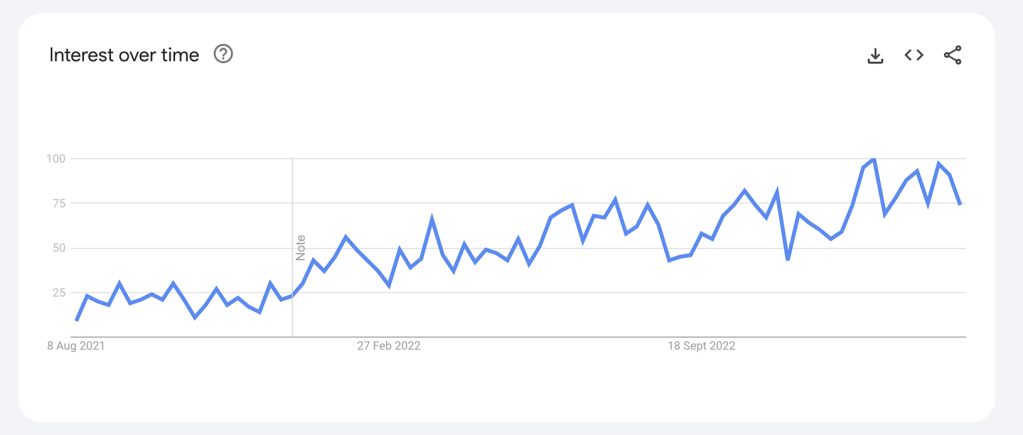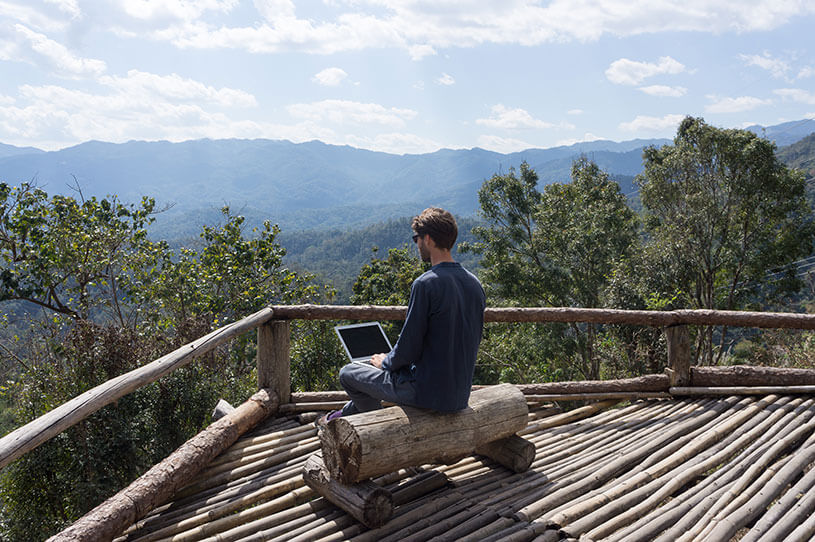Could a digital nomad visa give your self-employed life more freedom? Photos of laptops in beautiful settings have become commonplace on social media. But is running your business from anywhere in the world actually possible?
This guide explains the origins of this lifestyle trend and some of the practical things you need to consider – from tax implications and visas to timezones and internet quality.
What is a digital nomad?
A digital nomad is someone who works from different locations and uses technology to connect them to their job. It’s a lifestyle that gives people the opportunity to travel while earning a living.
The term ‘digital nomad’ has grown in popularity over the past few years with the rise of remote working as a result of the pandemic. And Google Trends data shows how the number of people searching this term has risen in the UK since 2021, with steady growth from the start of last year up until today.

‘Digital nomad’ search trends graph shows growing interest. Source: Google Trends
Of course, small business owners and the self-employed have always had the benefit of freedom when it comes to choosing where and when they work.
So, if the type of work you do is conducted largely online – if you’re a copywriter or coach for example – then you might be considering combining work and travel as a digital nomad.
‘Wonders for your mental health and your creativity’
Alex Merry runs a public speaking coaching business with his wife and recently decided to try running the company from abroad. They wanted to test the experience for five months to see how it could work.
“Consistent good weather can do wonders for your mental health and your creativity – I wrote my first book, Make It Count, in the five months we were away.
“One of the best bits of the lifestyle is you have a desire to explore new areas and try new things. We’re always heading somewhere new on the weekend, and that recharges the batteries for the following week.”
Tax and legal considerations
It’s easy to get excited about the prospect of seeing the world and running your business at the same time, but there are practical considerations that can’t be overlooked.
Tax – as long as you remain a UK resident you’ll need to pay tax as usual to HMRC. But some countries may require you to pay local taxes too.
Bank accounts – make sure your UK business bank account has services worldwide and you won’t be charged high fees for transactions while travelling. Challenger banks like Monzo, Revolut, and Starling are popular choices for use overseas.
Visas – you’ll need a visa to live and work in another country for any extended period of time. The rules vary from country to country and the process can be complicated.
Pension – as long as you’re continuing to pay National Insurance then your pension tax reliefs will stay the same, but if you give up your UK residency status then this will impact your pension.
Insurance – if you change how and where you’re running your business, let your business insurance provider know so you can be sure you have the cover you need.
This article is intended as a guide. Make sure you get professional tax and legal advice if you have any questions about taking your business overseas.
Countries with digital nomad visas – where could you work?
These are some popular countries with digital nomad visas in Europe (thanks to good quality internet and nice weather):
- Croatia
- Cyprus
- Greece
- Malta
- Portugal
- Italy – a digital nomad visa is approved but not implemented, but you might be able to apply for the self-employed worker visa for freelancers
You’ll need to prove a certain level of income as part of any visa application, so if you’re newly self-employed then this might be tricky.
It’s also worth noting that the visa process can be complicated. For example, a report in Politico highlights both the administrative challenges for people moving to Portugal and the reaction of residents on the influx of digital nomads.
SchengenVisaInfo.com has more information about visas in the Schengen Area in Europe, including the latest requirements for digital nomads.
Coworking spaces for digital nomads
Another thing to consider is where you’ll actually run your business from while you’re away from home. Are you going to set up a desk from your holiday rental or Airbnb? Or would a coworking space suit you better?
Research from The Social Hub found the best cities for coworking in Europe for people looking to travel and take their business with them. The rankings are based on factors such as the number of coworking spaces available, costs, wifi speeds, and living costs.
Spanish cities Barcelona, Madrid, and Valencia make up the top three coworking hubs in Europe, followed by Bristol and Sheffield in fourth and fifth respectively.
Our guide to coworking explains some of the benefits of using these spaces, whether you’re in the UK or elsewhere.

Working from a café as a digital nomad. Photograph: BullRun/stock.adobe.com
Ideas for the best digital nomad jobs
Alex found creativity and headspace to write a book and manage his public speaking business from Portugal and Morocco, but there are plenty of other jobs that could be suited to the nomadic lifestyle.
Reddit users at r/digitalnomad share the types of jobs they’ve tried as a digital nomad, including:
- teaching
- photography
- digital marketing
- web development
You could also consider taking your online business, passive income, or freelance graphic design work overseas.
‘Start with a month and see how it goes’
It can be tempting to want to just go for it, rent out your house, and book a flight. But Alex recommends experimenting with the digital nomad lifestyle before committing.
“The digital nomad lifestyle is something you can dabble with.
“You don’t need to go all in and live out of a VW camper van and be on the road the whole time. Just start with a month and see how it goes.”
Alex now says he plans to move back to the UK but spend a few months away each winter.
“It’s very easy to fall into the trap of thinking that being in one place is better than being in another, but the truth is, they’re just different and it’s about embracing them for what they are.
“Your problems still come with you, but being in a new place might just change how you handle them.”
Alex Merry is a public speaking coach and founder of MicDrop. Sign up to his newsletter for presentation tips.
Have you considered this lifestyle or tried applying for a digital nomad visa as a small business owner? Share your experience in the comments below.
Guides to help you run your business
- How to start a business from home
- Budget template for the self-employed
- Tips to improve your mental wellbeing
- How much business insurance do I need?
Looking for self-employed insurance?
With Simply Business you can build a single self employed insurance policy combining the covers that are relevant to you. Whether it’s public liability insurance, professional indemnity or whatever else you need, we’ll run you a quick quote online, and let you decide if we’re a good fit.
Photograph: Suzanne Plumette/stock.adobe.com
